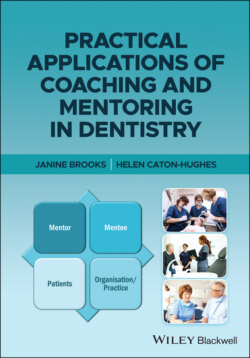Читать книгу Practical Applications of Coaching and Mentoring in Dentistry - Janine Brooks - Страница 11
History
ОглавлениеMentoring has slowly been gaining a position within dentistry since the Millennium with more and more dental professionals becoming familiar with the term and the concept of mentoring. It is also good to see this recognition from the statutory regulator for dental professionals.
Activities such as coaching and mentoring, where individuals are supported by other members of the dental profession, also have an important role to play here, and are valuable ways of enhancing the skills and approach of all involved.
Shifting the Balance: a better, fairer system of dental regulation
(GDC 2017).
Vernon Holt did much to champion mentoring within the dental profession and his series of articles written between 2008 and 2010 are referenced frequently through the literature. Holt produced his thesis in 2013 and it contains a rich mine for those wishing to know more about mentoring in dentistry.
I suggest that a culture proactively supportive of practitioners at all stages of their careers using routine mentoring could do more than any amount of audit of techniques, protocols or choosing of ‘the latest’ materials, to enhance the quality of care delivered. Furthermore, because the dentist has a leadership role in the practising environment, the quality of performance of the dentist in the team can have a profound effect on the morale and culture of the team of which he or she is a part. This in turn will influence the quality of patient care indirectly as well as the direct effect through his/her own clinical performance
(Holt 2013, p. 24).
It is from the 1980s that we start to see the emergence of a body of literature about mentoring in American business management (Colley 2002). Influential articles, particularly Roche's report, Much Ado about Mentoring (1979), claimed to have discovered mentoring as an informal but important part of a businessman's career. Mentoring in Britain then began to be seen as an American import, which had to be adapted to British culture. Clutterbuck was instrumental in the 1980s in bringing the idea of mentoring to Britain from the United States. He is regarded as the ‘grandfather’ of mentoring in the UK.
There is also anecdotal evidence to suggest that Continuing Professional Development (CPD) which involves interaction with professional colleagues has significant benefits when compared with other non‐interactive activities, e.g. reading, or online CPD. While there is room for a mix of CPD activity, we all need to consider how to ensure that the benefits of interactive CPD are recognized and realised. Activities such as coaching and mentoring, where individuals are supported by other members of the dental profession, also have an important role to play here, and are valuable ways of enhancing the skills and approach of all involved
(GDC Moving upstream 2020, p. 32).
